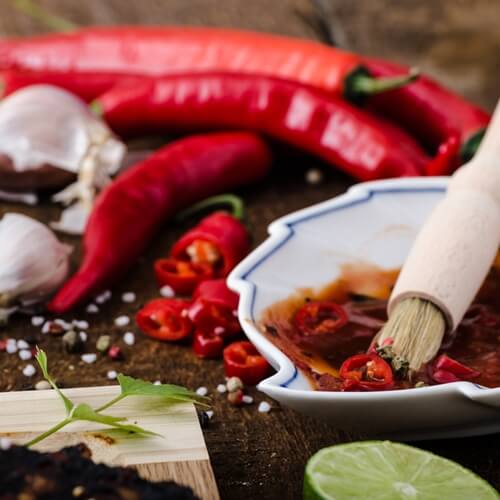The Mainstays of Marinating
Marinating, often synonymous with grilling steaks in the summer, is an easy cooking technique that can transform all types of meats and vegetables even in the winter months. With the right knowledge and ingredients and a little preparation, you can have a high-quality, flavorful meal that everyone will savor. Here are a few tips and tricks for preparing the best marinades:
Marinade basics
As most people know, marinating is the process of soaking a piece of meat (and, less commonly, fruits and vegetables) in a mixture to add flavor. The marinade is typically comprised of an acidic agent, oil and seasoning. The solution also adds moisture to the meat, which helps it stay moist and juicy throughout the cooking process, according to Whole Foods Market.
Depending on the food and type of marinade, the brine may tenderize the food’s outer layer or begin the cooking process. Therefore, it is important to know how to marinade each kind of fare.
Marinade time
Each type of meat and vegetable holds up differently when marinating. Seafood is more delicate, and an acidic marinade can cause the fish to begin cooking prematurely. For that reason, fish and shellfish should only sit in a marinade for one to two hours. If your marinade is extra acidic, that time should jump down to 20 to 30 minutes. Similarly, the prime marinade time for tofu and vegetables is 30 minutes to an hour. More hearty meats such as beef and pork can withstand up to 24 hours. However, the main flavor perks of marinating meats happens within the initial few hours.
If you are short on time, marinating food that you are about to cook, even for a handful of minutes, positively impacts taste.
Marinade safety
The last thing any chef wants is to accidentally make the food unsafe for consumption. Thus, all food should marinade in the refrigerator to prevent the growth of bacteria. When you are ready to cook your meal, you can repurpose your marinade as a brine by boiling on the stove for at least five minutes to kill bacteria, according to Cooking Light. Instead, the U.S. Department of Health and Human Services suggested reserving some of your marinade before soaking your raw food in it. This process reduces the risk of contamination altogether.
Tips for success
The container material that you use to marinate your food makes a difference. The best containers to use are nonreactive, like ceramic, glass, plastic or stainless steel. If you use reactive metal containers such as aluminum or copper, your food may assume a metallic taste due to the acid found in marinades. Often, reactive containers also discolor food.
Cooking Light recommended that cooks leave salt out of marinades for dishes that call for the ingredient. Instead, add the recommended amount of salt after your meal has been cooked to replace any lost flavor because often times seasonings are discarding along with the extra marinade.
Are you interested in learning more about creating delicious, flavor-packed food? Enroll in culinary academy today.


